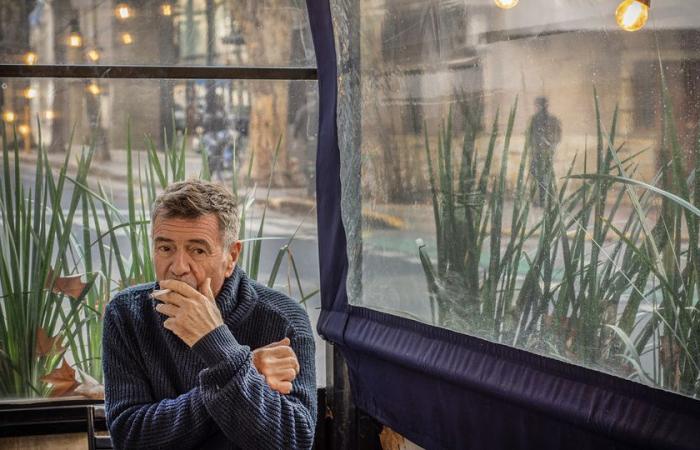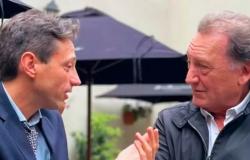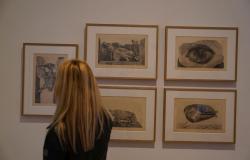
Go to the bone to explore vileness and degradation in a small town on the coast. There are writers who do not take respite from the first sentence. “The body will dawn in a southern neighborhood, five 9 mm impacts (…) nobody saw anything. But the blood is. Let’s not make ourselves those who did not see. Someone always saw. And it could be seen seeing. We are few in this villa and we know each other, the bad news circulates before the radio, the TV and the newspaper. And if it scraped a little, connections will be found between the murder and the member of the murder. Thus begins The wind will burnby Guillermo Saccomanno, with which he won the Alfaguara novel awardendowed with 175 thousand euros, and will present next week at the Book Fair. The emergence of a strange marriage, the Esterhazy, which buys the Habsburg hotel, will unleash a plot of sex, money, betrayal, murders and corruption.
The writer, columnist of Page/12, He appeals to a choral voice, a “we” who tell the story of the sterházy and that points the sores and miseries that grow as fungi: “Everyone looks else Plural, which also accounts for the repressed fury and humiliation of several characters in that community. Poisoned dogs, three killed boys, a suicide baby, a father kicked until death, a curator shot. Saccomanno, Author of awarded soap operas as The office workerwith which he won the Brief Library of Novel Seix Barral, and Gesell Chamberwith which he won the Dashiell Hammett awarddoes not seek to please readers. He prefers to disturb as a moscardón that zumba in the conscience of those who are going through their pages.
His work – from the initial Danger situationgoing through good pain and the trilogy on violence composed of The tongue of the malon, Argentine love y 77– Put the legs at the source of Argentine literature to besiege imposters and build a language Sacomannialso recognizable in less rough modulations as in Antonio o Blackbirdbeautiful books connected by friendship. Or in their articles and journalistic chronicles, such as Written in Patagoniapublished by La Flor Azul, which he presented at the beginning of this year in Villa Gesell, where he has lived for more than thirty years.
-I will “burn the wind” to Villa Gesell, it is named as the “Villa”, a geographical and literary space that is also in other books of yours such as “Gesell Chamber” and “Mirlo”. Why did you decide to return to Gesell, literally speaking?
-I didn’t come back; is that I never left the town. And I prefer to talk about the town, the fictional territory, and not of Gesell, the real place. My literature tries not to be realistic, there I enhance too many features of the real, I exaggerate, and then the exaggeration surpasses me. But in distortion I find a certain truth of the facts. After all, I face an idea of (Antonio) Dal Masetto: “Reality exaggerates.” Sometimes in stories, sometimes in a little more extensive stories, the town forms a territory for my writing. On the other hand, or the same, the town is not only exactly Villa Gesell but is the recreation of a functional space to warn fictions: everything that happens in the town metaforizes a broader context than the small payment. Although the landscape seems common, the coastal people, a varied population is a metaphor around, the world. And at this point the circulation of rumor is usually the most suitable for reflecting this or that fact. The dream of many writers is to create a territory. Major examples: (William) Faulkner and his Yoknapatawpha, (Gabriel) García Márquez and his Macondo. At this point, zero originality mine. If one lives in a town and pays attention to the voices, you will always find stories to narrate and cross them.
-Why even today nobody wants to talk about the coastal village as a “refuge of Nazis”, according to the narrator of “will burn the wind”?
-The time has elapsed since then and it becomes impossible to find vestiges and/or evidence of that past. However, I risk that if our country took Nazis after the war why not think what also happened in the town. This was not the country of (Adolf) Eichmann and (Erich) Priebke. There is a whole mythology about it in the people. Without denying it, I am more interested in, closer in time and space, the real finding of missing ones thrown into the sea on death flights. And this fact is unquestionable and not mythology.
-After reading the novel, one observes or wonders, like Father Miguel, who is clean of blame to throw the first stone. What role does it fulfill in societies such as the Villa of the novel?
-In any society there is purity. The guilt circulates, quiet, poisonous. In this regard, I usually quote (Tzvetan) Todorov: a country that had concentration camps has a heart eaten by worms. At this point the fault fuel all the time, even if you look elsewhere, even if you deny it. If there is a crime and no one saw or listened to anything, it is not that they are all innocent but that they all pretend innocence. That is, civil complicity. In the novel everyone spends some vileness, some betrayal. From the boys who assemble a Mataperros sect to the officials, all are lost in a violence that goes from the private to the public, which covers from the neighbors the officials linked to real estate speculation and the coima narco. And all while a sahumerium is turned on or yoga … ooooom. None of this is alien to me. Nor is it unlikely.
-I will “burn the wind”, a kid is killed by the police in the back. “If he had been a middle class boy committing some trapsonda, his identity would have been protected and the Barroso commissioner would have turned a blind eye as he fixed a figure with the parents, good neighbors,” he reads in the novel. How do you explain this “double moral” of the middle class, which asks for a hard hand against the jet kids, but when it is a son of them that steals or kills the distracted is made?
--The double standard is the condition of the middle class and not only. Also the inhabitants of the settlements ask for a hard hand. The rightization of society is the result of resentment and save who can in the absence of social projection policies. I speak of the unfair cast of the wealth concentrated in a few hands. If resentment is an engine in the novel, it is also the logic of its characters that orbit around the triad Sex-Dinero-Poder.
-How do you relate this “double moral” of the middle class what the narrator states: “There are seconds and seconds of second”?
-The first and second lives are nothing more than the expression of the class struggle.
-Veryly, the novel proposes another “crack”, which has not to do directly with Kirchnerismo-Antikirchnerism, but with a crack that focuses on social class. Do you like literature to have carnadura in the class struggle, if we take the expression of Marxism?
-Is that I did not believe or believe in the crack, hypocritical euphemism to cover up the class struggle. And I think this goes beyond the K versus the Antik. At no time was the crack’s approach interested. Talking about crack is to dodge the bulge to the concentration of wealth in a few hands, and refers, as I said, to the class struggle. Let’s see, there is no literature that escapes these tensions of reality, this is different genres, the literature of the self, the horror, the historical one. As soon as she revolts a little in the texts there, reality jumps in the speeches with their contradictions. And this does not mean pretending the deliberate finding of a line descent. The speeches speak for the authors.
-Don, the journalist of the novel is all the time pressed by the mayor and the commissioner. Although he tries to do the best possible journalism, he can little. How do you analyze the present of journalism?
-The journalism, like so many other activities, in this sad present, is saved honorable exceptions, a swamp of corruption and deterioration. Sometimes I think reality can be read better if you try to malice a channel like chronicle. Human misery is more readable in the analysis of television economists. Maybe he represents us with more authenticity. Any degradation that can invent in a novel is minimal compared to that of the news.
-I like to remember that John Berger said that you have to write with hope between the teeth. What gives you hope today when the left, the parties and sectors that some were progressive, have capitulated and no longer believe that the world can be changed?
-My pessimism is increasingly healthy. And I write without taking into account progressively and rights. They are there, they were always, they will always be. In addition, who can import what a writer thinks of the destiny of humanity. I don’t think (William) Shakespeare cares about this matter a lot. Nor does it seem to me that literature can change things. At most it can be a phosphorus on at night. Personally, I wrote this novel in three months of summer while I had a pneumonia, covid, another pneumonia and everything during an eviction of the topera where I lived. I can swear that nothing mattered to me except writing every day. If the chapters are brief, it is because I could not write more than two veneers per day. If I wanted to arrive at an end, the only thing I could distract was the thermometer or the tensiometer.
*The wind will burn It will be presented on Tuesday, May 6 at 7:00 p.m. in the Domingo Faustino Sarmiento room of the La Rural property. Guillermo Saccomanno will dialogue with Claudio Zeiger.





